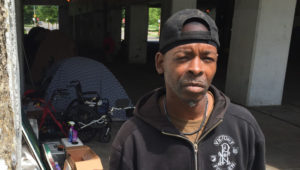By Mark Brown, columnist
As I keep saying, if only they knew where to go.
“It’s crunch time now,” said Louis Jones, the street savvy leader of the Wilson viaduct group who expects the situation to “get a whole lot worse” before it gets better.

Although long anticipated, the deadline will add to the normal stress of living on the street as the homeless contend with relocating.
With backing from the Chicago Coalition for the Homeless, the people occupying the Uptown viaducts are asking the city to provide them with permanent housing.
So far, there is no indication the city expects to be able to do that.
Counts of the homeless population at the two locations vary.
Lisa Morrison Butler, commissioner of the city Department of Family and Support Services, said her outreach workers counted 43 tents and 25 people on their last visit, leading her to estimate a population of 25-43.
Jones, known on the street as Abdul, said the average nightly count is closer to 50.
“I’ve got nine new clients in the last week and a half,” he said, adopting social worker-speak. Jones noted that two of the recent arrivals had just been released from Cook County Jail. “Wherever they’re running people off in the city, they’re coming here.”
Morrison Butler said the city may be able to house 19 of these individuals with affordable housing openings that went unused during a 2016 pilot program aimed at vacating the two tent encampments. The tent residents are being evaluated to determine who is most in need of housing, she said.
Most of the 75 individuals living in the encampments at the start of the 2016 pilot program were relocated, but others moved in to take their place.
In addition to the 19 openings for temporary or permanent housing, Morrison Butler said the city should have beds available in its homeless shelters for the tent residents.
But people living under the viaducts often refuse to live in shelters, preferring the homeless encampments for a variety of reasons ranging from having more freedom to feeling more safe.
The tents have been a point of tension with some neighbors who complain the homeless are blocking access to Lake Michigan.
I wish those people could see how hard Jones tries to run a tight ship, ordering his homeless neighbors to clean up their messes and to control rowdiness.
In a strange way, the camps have performed a valuable community service by putting homelessness front and center on the Lakefront instead of buried in the city’s nooks and crannies where nobody sees it.
Lawyers from the Coalition for the Homeless said they have yet to meet with the city in response to their written threat to file a lawsuit over the construction project.
Nobody denies the need for the repair work.
But the coalition contends the design of the project, which will place bike lanes on the sidewalk where homeless people now have tents, is a violation of the Illinois Bill of Rights for the Homeless Act because it’s purpose is to prevent them from returning.
The city denies any such intent, pointing to a bicycling plan released in 2012 that calls for Lawrence to be a major bike route connecting to the Lakefront Path.
Another factor in the drama ahead is a group called Uptown Tent City Organizers, which helped supply many of the tents the homeless people are using.
The activist group pushes a more aggressively political agenda, but also has been effective in highlighting the plight of the homeless.
I’ve seen this movie before. It never ends well for the little guy.
